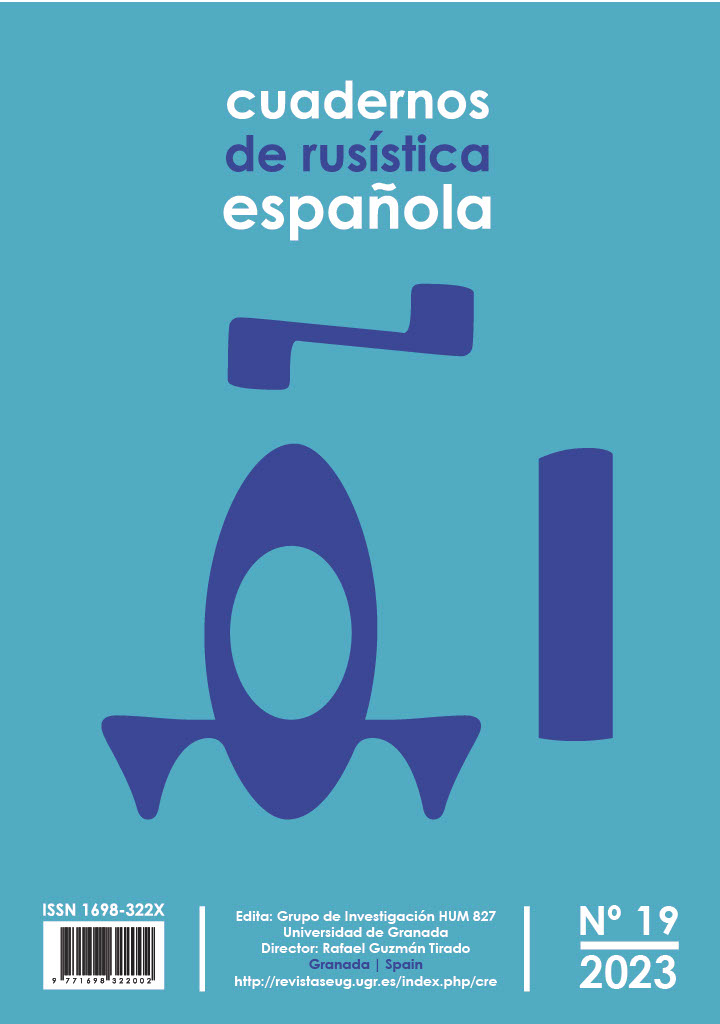La metodología del desarrollo de la actividad intelectual de los futuros especialistas de los filólogos en formato online
DOI:
https://doi.org/10.30827/cre.v19.29077Palabras clave:
intellectual activity, conceptual content, mental model, methodological model, electronic course, educational processResumen
El artículo aborda el problema del desarrollo de la actividad intelectual de los futuros especialistas en Filología en el proceso de aprendizaje. En el sistema educativo moderno, hay un mayor interés en la competencia digital de los graduados de la Universidad, el uso de métodos y tecnologías tradicionales ha agotado sus posibilidades, especialmente en condiciones de aprendizaje mixto. En este sentido, fue necesario revisar los métodos de enseñanza habituales y encontrar mejores, utilizando todas las capacidades técnicas del entorno digital para activar la actividad intelectual de los estudiantes. En este trabajo, se realizó un análisis conceptual de la esencia mental del concepto de «actividad intelectual» en el formato de un mapa intelectual, sobre su base, se identificaron los dominantes conceptuales que se utilizaron para modelar el sistema metódico de desarrollo de la actividad intelectual en el proceso de capacitación profesional. Se presentan los resultados de la investigación sobre el contenido y los mecanismos de la actividad intelectual interna y externa del sujeto de la enseñanza, cuya comprensión permitirá a los profesores organizar efectivamente el proceso de aprendizaje. La importancia de este trabajo radica en el hecho de que, sobre la base de la generalización de la información conceptual sobre la esencia mental del concepto de «actividad intelectual», se desarrolló y probó un modelo metódico de formación de competencias profesionales de futuros especialistas en filólogos a través de la activación de su actividad intelectual en el proceso de estudio del curso electrónico en la disciplina «Vocabulario y lexicografía en el aspecto de la sincronía y la diacronía». Creado según el modelo metódico, el curso electrónico ha permitido aumentar la motivación educativa de los estudiantes, ha Asegurado el trabajo conjunto productivo del profesor y los estudiantes en plataformas digitales a través de la integración de métodos de enseñanza tradicionales e innovadores.
Descargas
Citas
ABAIDELDANOVA, M.K., LARINA, T.V. (2021): Intellektual'naya aktivnost' i tsifrovizatsiya – realii novogo formata vysshego lingvisticheskogo obrazovaniya. VESTNIK Yevraziyskogo natsional'nogo universiteta im. L.N. Gumileva. Seriya Filologiya, 2 (135), S. 110–119. DOI: 10.32523/2616-678Х-2021-135-2-110-119.
ASHILOVA, M.S., BEGALINOV, A.S., BEGALINOVA, K.K. (2019): O vliyanii tsifrovizatsii obshchestva na kazakhstanskoye obrazovaniye. Science for Education Today, Research Electronic Journal, 9(6), S. 40–51. DOI: https://doi.org/10.15293/2658-6762.1906.03
BOGOYAVLENSKAYA, D.В. (2019): Filosofskiye osnovy teorii odarennosti. Kul'turno-istoricheskaya psikhologiya, 15(2), S. 14–21.
BOGOYAVLENSKAYA, D.В., KOTLYAROVA, L.A. (2017): Methodological concepts of building up the creativity typology. SOCIETY. INTEGRATION. EDUCATION. Proceedings of the International Scientific Conference. Volume I, p. 469–476. DOI: https://doi.org/10.17770/sie2017vol1.2298
BÖRÜ, N. (2018): The factors affecting teacher-motivation. International Journal of Instruction, 11(4), p. 761–776. DOI: https://doi.org/10.12973/iji.2018.11448a
BUZAN, T. (2018): Mind Map Mastery: The Complete Guide to Learning and Using the Most Powerful Thinking Tool in the Universe // T. Buzan. London: Watkins Publishing.
BUZAN, T. (2002): How to Mind Mapping: The ultimate thinking tool that will change your life. London: Thorson: 6.
DE RIBAUPIERRE, A. LECERF, T. (2017): Intelligence and Cognitive Development: Three Sides of the Same Coin. J. Intell, 5 (2), p. 14. DOI: https://doi.org/10.3390/jintelligence5020014
ERDEM, A. (2017): Mind Maps as a Lifelong Learning Tool. Universal Journal of Educational Research, 5 (12A), p. 1–7. DOI: https://doi.org/10.13189/ujer.2017.051301
GIRVAN, C. (2016) Extending experiential learning in teacher professional development. Teaching and Teacher Education, 58, p. 129–139. DOI: https://doi.org/10.1016/j.tate.2016.04.009
KOSTROMINA, S. (2013): Academic Skills as a Basis for Self-organization of Human Activity. Procedia – Social and Behavioral Sciences, 86, p. 543–550. DOI: https://doi.org/10.1016/j.sbspro.2013.08.611
MISHINA, M.M. (2014): Spetsifika intellektual'noy deyatel'nosti lichnosti. Vestnik Moskovskogo gosudarstvennogo oblastnogo universiteta. Seriya: Psikhologicheskiye nauki, 1, S. 6–12.
MUSIYCHUK, M.V., PAVLOV, A.P. (2016): «Layfkhak» kak forma intellektual'noy aktivnosti v sovremennykh intellektual'nykh sistemakh. Internet zhurnal «Mir nauki», 4 (1), S. 1–11.
NETO, M. (2015): Educational motivation meets Maslow: Self-actualisation as contextual driver. Journal of Student Engagement: Education Matters, 5(1), p. 18–27.
OZHIGANOVA, G.V. (2018): Self-regulation and self-regulatory capacities: components, levels, models. RUDN Journal of Psychology and Pedagogics, 15 (3), p. 255–270. DOI: https://doi.org/10.22363/2313-1683-2018-15-3-255-270
PICHUGINA, G.A. (2020): Productive and reproductive teaching methods in the organization of modern education. Balkan Scientific Review, 4(10), p. 16–19. DOI: https://doi.org/10.34671/SCH.BSR.2020.0404.0004
POPOV, L., IBRAGIMOVA, E. (2015): Psychology of intellectual activity-related development of a student. Asian Social Science, 1, p. 279–287. DOI: https://doi.org/10.5539/ass.v11n1p279
RICARDO NACOR RÍOS-LOZADA et.al., (2022): Google Classroom in Educational Service: A systematic Review. Journal of Positive School Psychology, 6(2), p. 1634–1639.
ROMANOVA, L.L. (2023): Spetsifika professional'nogo obucheniya v usloviyakh razvitiya tsifrovizatsii i iskusstvennogo intellekta. Nauchno-metodicheskiy elektronnyy zhurnal «Kontsept», 07, S. 130–141.
STEINMAYR, R., WEIDINGER, A.F., SCHWINGER, M. SPINATH, B. (2019): The importance of students’ motivation for their academic achievement – Replicating and extending previous findings. Frontiers in Psychology, 10, Article number: 1730. DOI: https://doi.org/10.3389/fpsyg.2019.01730
SURYANINGTYAS, A., KIMIANTI, F., KUN PRASETYO, Z. (2019): Developing science electronic module based on problem-based learning and guided discovery learning to increase critical thinking and problem-solving skills. Advances in Social Science, Education and Humanities Research. International Conference on Educational Research and Innovation (ICERI 2019), p. 65–70. DOI: https://doi.org/10.2991/assehr.k.200204.013
TAYLOR, S.A., HUNTER, G.L., MELTON, H., GOODWIN, S.A. (2011): Student Engagement and Marketing Classes. Journal of Marketing Education, 33, p. 73–92. DOI: https://doi.org/10.1177/0273475310392542
TEE, T.K., AZMAN, M.N.A., MOHAMED, S. (2014): Buzan Mind Mapping: An Efficient Technique for Note-Taking. World Academy of Science, Engineering and Technology International Journal of Psychological and Behavioral Sciences, 8 (1), p. 28–31.
Tolkovyy slovar' russkogo yazyka pod redaktsiyey D.N. Ushakova. URL: https://ushakovdictionary.ru/. Data obrashcheniya: 30.06.2023.












